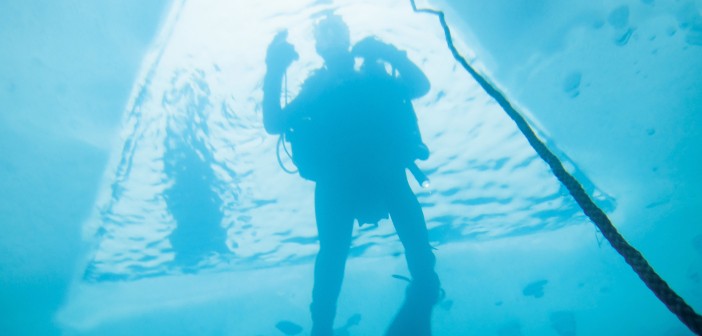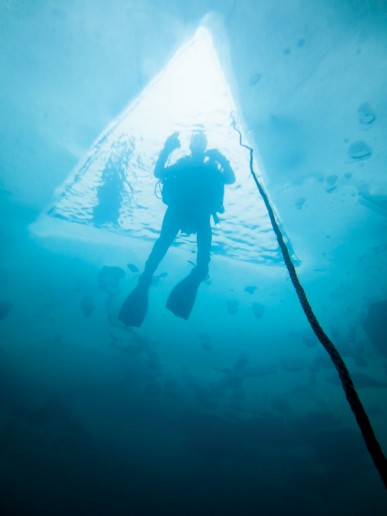Brrr! It’s cold outside! While some folks enjoy cozying up to a warm fire during the winter months, there is a group of adventure seekers who don’t mind the frigid temperatures.
These adventurers put on a dry suit and go ice scuba diving in one of Genesee County’s many lakes. Kim Vold, co-owner of The Dive Shop in Flint, is one of those brave souls. “We dive in the summer and the winter,” Vold laughs. “We don’t do quite as much winter diving, because there are airplanes that will take us where the water’s warm!”
Ice scuba diving is one of the classes taught at The Dive Shop. “It isn’t for the faint of heart,” Vold admits. “A lot of people think they want to ice dive and then they get out on the lake, look into that hole in the ice, shake their heads and say, ‘No, I’m good.’”
Once the classroom instruction is completed, the students head to a frozen lake for further training. One must be ice certified and dry-suit certified in order to dive. A dry-suit has seals that keep water out, and insulated under-clothing can be worn to help keep the diver warm. The cold-weather adventurers have ice-dived in lakes all over, including Lake Fenton and Otter Lake. The last couple of years, however, have been too cold for ice-diving, Vold reports.
It takes about two hours to prep the ice for 15 minutes of diving. Safety, of course, is of the utmost importance, and there must be a good six inches of solid ice for it to be safe. The divers first cut out a triangle of ice – about seven feet in size. The snow around the hole is shoveled in circles with a spoke pattern that has arrows pointing back to the opening. Safety lines are used that will lead the diver back to the hole, and a series of hand signals are used to communicate with the diver. The temperature of the lake flips in the winter, Vold explains. He says the warmer water goes to the bottom, and the fish are a lot more sluggish, so the divers can get a lot closer to them. “When the sunlight reflects on the ice, the whole lake lights up and it’s like diving in florescent light!” he exclaims. A dive usually lasts about 15 to 20 minutes, depending on the group and how experienced they are. Is ice-diving dangerous? “The risk is higher,” says Vold. “But it’s not dangerous if it is done correctly.”
Vold has been scuba diving since 1975 and is passionate about it. He became interested in the sport by watching television shows like Sea Hunt when he was a kid. He loves the outdoors and enjoyed snorkeling while growing up. Vold has gone scuba diving all over the world in places like the Bahamas, Mexico, the Florida Keys, South Africa and Hawaii, to name a few. “Every place is different,” he says. “That’s the nice part about it.”
Vold was excited to turn his passion into a job when he opened The Dive Shop with co-owner, Kevin Stiff. Now he shares his passion for scuba diving with others by selling gear and giving lessons. The Dive Shop also repairs equipment and plans group diving excursions.
“Ice-diving keeps me doing what I love in the winter months,” Vold adds. “My favorite place to be is in the water.”















